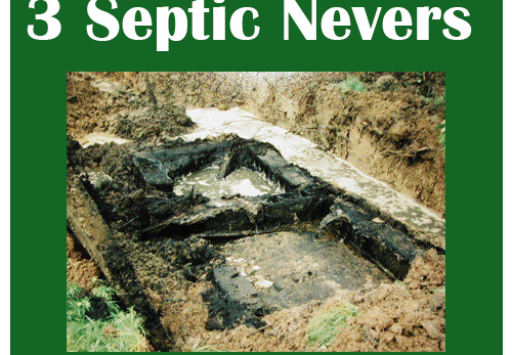Three Septic Nevers
The only items that go down your pipes and into your septic tank and drain field are what dissolves. Grease and oil, either as a result of cooking or frying when warm can slide right down your drain. The problem occurs when the grease and oil cool and become a congealed mass. This does not dissolve and remains as a mass in your septic. Over time, the mass becomes very thick which will cause the scrum layer to push down into the liquid level and possibly reaching the exit pipes of the septic system.
Three culprits in clogging your septic systems:
- Grease and oils
- Cat litter
- Paint or paint thinners (hazardous waste)
Your septic's main job is to dispose of the affluence in the home. For such an unseen machine, its job is to break down waste and render it harmless. Pouring grease down a drain, will over time, ends up clogging your drain and nothing will get through. Too much grease and oil bogging down your septic functionality can make it back up, in turn, causing serious as well as expensive damage to it.
Disposing of grease and oil, including olive oil, properly is a great habit to get into. After cooking or frying pour all grease in a can, let it cool, and throw it away. Wipe pans out with a paper towel and toss them in the trash.
Once or twice, allowing grease or oil down the drain is not the problem. The issue becomes when the septic system cannot do its job at dissolving matter. The septic systems distribution lines and drainage field can also be affected. Grease that you pour down the drain ends up floating on top of the water in the tank and interferes with the way water and the broken-down waste flow out into your septic leech field. Developing good habits to dispose of grease helps protect the septic.
A septic system pumping and disposal will help to remove grease and fat, this is a job for the professionals at Tri-County Septic. If grease and fat is not removed from your septic system, your septic pipes may have to be dug up and replaced.
Anything other than waste and toilet paper does not go in your toilet. Cat litter, even if the label says septic safe, is not safe and needs to go out in the regular trash. Cat litter clumps and does not dissolve. Also, by the nature of what cat litter is used for, there are microorganisms that can cause illness. Cat litter can cause serious damage to your septic system.
Hazardous waste, which includes paint and paint thinners is far too corrosive for your septic. Even washing off paintbrushes or rinsing out paint cans or cans of paint thinner need to be outside and away from your septic. These liquids will eat away at the tubing and filtration system in your septic.
Avoiding items that harm your septic system will go a long way to allowing the septic to do its job of breaking down waste and keeping not only your family but the neighborhood groundwater and wells safe.
